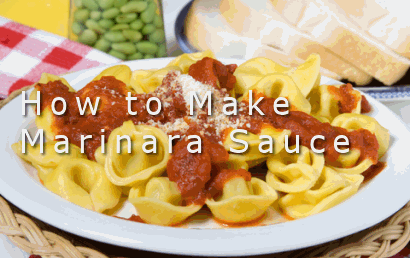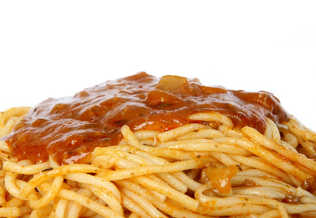How to make marinara sauce including a step-by-step recipe.

When it comes to discussing the ingredients of a good marinara sauce there always seems to be some kind of confusion. If you were under the impression that marinara sauce contained some type of fish or seafood, you could not be blamed for doing so, as its name does suggest this.
However, you would most definitely be mistaken, unless you actually live in Italy, in which case it's a different matter altogether.
If you live in the United States and often frequent Italian restaurants, you will know that marinara sauce is a tomato-based sauce served with pasta that contains additional ingredients such as garlic, olive oil and fresh herbs.
However, you would most definitely be mistaken, unless you actually live in Italy, in which case it's a different matter altogether.
If you live in the United States and often frequent Italian restaurants, you will know that marinara sauce is a tomato-based sauce served with pasta that contains additional ingredients such as garlic, olive oil and fresh herbs.
Advertisements
Alternatively, if you reside in Italy or even in Spain, marinara sauce, as its name implies, is a tomato-based sauce containing ingredients such as squid, prawns and mussels.
Some people claim that marinara sauce originated in Naples during the mid-sixteenth century, around the time when tomatoes were first introduced to the region.
For the purpose of this article we are going to concentrate on the marinara sauce that does not contain seafood, and which some say is the "true" and only marinara sauce.
Marinara sauce is very simple and quick to prepare and is delicious served with all types of pasta.
The main ingredient is tomato, which should come in the form of canned whole or crushed tomatoes. Other traditional ingredients are garlic, usually quite a lot of it, olive oil, fresh basil and oregano.
There are many variations on the ingredients of marinara sauce and other ingredients that you may find in recipes are onion, carrots, sugar, white wine, parsley and bay leaves.
Food always tastes better when you cook with fresh herbs, but if you do not have any to hand, you can substitute the fresh herbs with dried herbs, using only 1 teaspoon of dried herbs to each tablespoon of fresh herbs.
The sauce can be prepared in around 30 minutes, although if you are able to make the sauce the day before you are planning on serving it, you should end up with a richer, fuller and more flavoursome marinara sauce, as the ingredients are allowed to sit and infuse together.
Once cooked, the sauce can be served immediately, stored for up to 5 days in the refrigerator or it can be frozen until needed.
Below is a simple but classic recipe for marinara sauce, followed by links to two other variations.
Some people claim that marinara sauce originated in Naples during the mid-sixteenth century, around the time when tomatoes were first introduced to the region.
For the purpose of this article we are going to concentrate on the marinara sauce that does not contain seafood, and which some say is the "true" and only marinara sauce.
Marinara sauce is very simple and quick to prepare and is delicious served with all types of pasta.
The main ingredient is tomato, which should come in the form of canned whole or crushed tomatoes. Other traditional ingredients are garlic, usually quite a lot of it, olive oil, fresh basil and oregano.
There are many variations on the ingredients of marinara sauce and other ingredients that you may find in recipes are onion, carrots, sugar, white wine, parsley and bay leaves.
Food always tastes better when you cook with fresh herbs, but if you do not have any to hand, you can substitute the fresh herbs with dried herbs, using only 1 teaspoon of dried herbs to each tablespoon of fresh herbs.
The sauce can be prepared in around 30 minutes, although if you are able to make the sauce the day before you are planning on serving it, you should end up with a richer, fuller and more flavoursome marinara sauce, as the ingredients are allowed to sit and infuse together.
Once cooked, the sauce can be served immediately, stored for up to 5 days in the refrigerator or it can be frozen until needed.
Below is a simple but classic recipe for marinara sauce, followed by links to two other variations.
Marinara sauce with garlic
 Marinara sauce with garlic
Marinara sauce with garlic
Recipe description
This recipe for a simple marinara sauce contains tinned Italian tomatoes which are mashed together with garlic, torn basil leaves, olive oil and dried oregano and left to simmer for 30 minutes or until the sauce has reduced and thickened. This sauce can be prepared in advance, stored in the refrigerator and used when needed. Serves: 2 persons
Prep time: 10 mins
Cooking time: 30 mins
Total time: 40 mins
Recipe instructions
- Chop the garlic into small pieces.
- Heat the olive oil over a medium heat in a medium-sized saucepan.
- Add the garlic and fry gently until light brown.
- Crush the tomatoes or mash them with a fork or potato masher and add to the garlic with the juices from the can.
- Then add the oregano, chopped basil, salt and pepper and stir the ingredients to mix thoroughly.
- Bring the mixture to the boil, stirring occasionally.
- Once the sauce begins to boil, reduce the heat to low and simmer gently for 25 - 30 minutes or until the sauce has thickened.
- The sauce is now ready to serve or can be stored in an airtight container until needed.
For other variations on marinara sauce, read and try out some of the following recipes.
This is a great recipe for a simple marinara sauce. It contains the basic ingredients of tinned tomatoes, olive oil, basil leaves, onion and oregano and is best served with pasta.
This is a classic recipe for marinara sauce which is flavoured with fresh basil, red wine, garlic, sugar and olive oil. Serve with pasta.
Advertisements


